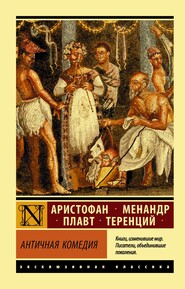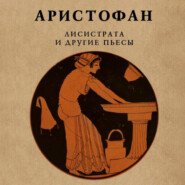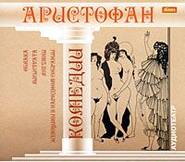По всем вопросам обращайтесь на: info@litportal.ru
(©) 2003-2024.
✖
The Eleven Comedies, Volume 1
Автор
Год написания книги
2018
Настройки чтения
Размер шрифта
Высота строк
Поля
406
In the original "we are nothing but Poseidon and a boat"; the allusion is to a play of Sophocles, now lost, but familiar to Aristophanes' audience, entitled 'Tyro,' in which the heroine, Tyro, appears with Poseidon, the sea-god, at the beginning of the tragedy, and at the close with the two boys she had had by him, whom she exposes in an open boat.
407
"By the two goddesses,"—a woman's oath, which recurs constantly in this play; the two goddesses are always Demeter and Proserpine.
408
One of the Cyclades, between Naxos and Cos, celebrated, like the latter, for its manufacture of fine, almost transparent silks, worn in Greece, and later at Rome, by women of loose character.
409
The proverb, quoted by Pherecrates, is properly spoken of those who go out of their way to do a thing already done—"to kill a dead horse," but here apparently is twisted by Aristophanes into an allusion to the leathern 'godemiche' mentioned a little above; if the worst comes to the worst, we must use artificial means. Pherecrates was a comic playwright, a contemporary of Aristophanes.
410
Literally "our Scythian woman." At Athens, policemen and ushers in the courts were generally Scythians; so the revolting women must have their Scythian "Usheress" too.
411
In allusion to the oath which the seven allied champions before Thebes take upon a buckler, in Aeschylus' tragedy of 'The Seven against Thebes,' v. 42.
412
A volcanic island in the northern part of the Aegaean, celebrated for its vineyards.
413
The old men are carrying faggots and fire to burn down the gates of the Acropolis, and supply comic material by their panting and wheezing as they climb the steep approaches to the fortress and puff and blow at their fires. Aristophanes gives them names, purely fancy ones—Draces, Strymodorus, Philurgus, Laches.
414
Cleomenes, King of Sparta, had in the preceding century commanded a Lacedaemonian expedition against Athens. At the invitation of the Alcmaeonidae, enemies of the sons of Peisistratus, he seized the Acropolis, but after an obstinately contested siege was forced to capitulate and retire.
415
Lemnos was proverbial with the Greeks for chronic misfortune and a succession of horrors and disasters. Can any good thing come out of Lemnos?
416
That is, a friend of the Athenian people; Samos had just before the date of the play re-established the democracy and renewed the old alliance with Athens.
417
A second Chorus enters—of women who are hurrying up with water to extinguish the fire just started by the Chorus of old men. Nicodicé, Calycé, Crityllé, Rhodippé, are fancy names the poet gives to different members of the band. Another, Stratyllis, has been stopped by the old men on her way to rejoin her companions.
418
Bupalus was a celebrated contemporary sculptor, a native of Clazomenae. The satiric poet Hipponax, who was extremely ugly, having been portrayed by Bupalus as even more unsightly-looking than the reality, composed against the artist so scurrilous an invective that the latter hung himself in despair. Apparently Aristophanes alludes here to a verse in which Hipponax threatened to beat Bupalus.
419
The Heliasts at Athens were the body of citizens chosen by lot to act as jurymen (or, more strictly speaking, as judges and jurymen, the Dicast, or so-called Judge, being merely President of the Court, the majority of the Heliasts pronouncing sentence) in the Heliaia, or High Court, where all offences liable to public prosecution were tried. They were 6000 in number, divided into ten panels of 500 each, a thousand being held in reserve to supply occasional vacancies. Each Heliast was paid three obols for each day's attendance in court.
420
Women only celebrated the festivals of Adonis. These rites were not performed in public, but on the terraces and flat roofs of the houses.
421
The Assembly, or Ecclesia, was the General Parliament of the Athenian people, in which every adult citizen had a vote. It met on the Pnyx hill, where the assembled Ecclesiasts were addressed from the Bema, or speaking-block.
422
An orator and statesman who had first proposed the disastrous Sicilian Expedition, of 415-413 B.C. This was on the first day of the festival of Adonis—ever afterwards regarded by the Athenians as a day of ill omen.
423
An island in the Ionian Sea, on the west of Greece, near Cephalenia, and an ally of Athens during the Peloponnesian War.
424
Cholozyges, a nickname for Demostratus.
425
The State treasure was kept in the Acropolis, which the women had seized.
426
The second (mythical) king of Athens, successor of Cecrops.
427
The leader of the Revolution which resulted in the temporary overthrow of the Democracy at Athens (413, 412 B.C.), and the establishment of the Oligarchy of the Four Hundred.
428
Priests of Cybelé, who indulged in wild, frenzied dances, to the accompaniment of the clashing of cymbals, in their celebrations in honour of the goddess.
429
Captain of a cavalry division; they were chosen from amongst the Hippeis, or 'Knights' at Athens.
430
In allusion to a play of Euripides, now lost, with this title. Tereus was son of Ares and king of the Thracians in Daulis.











